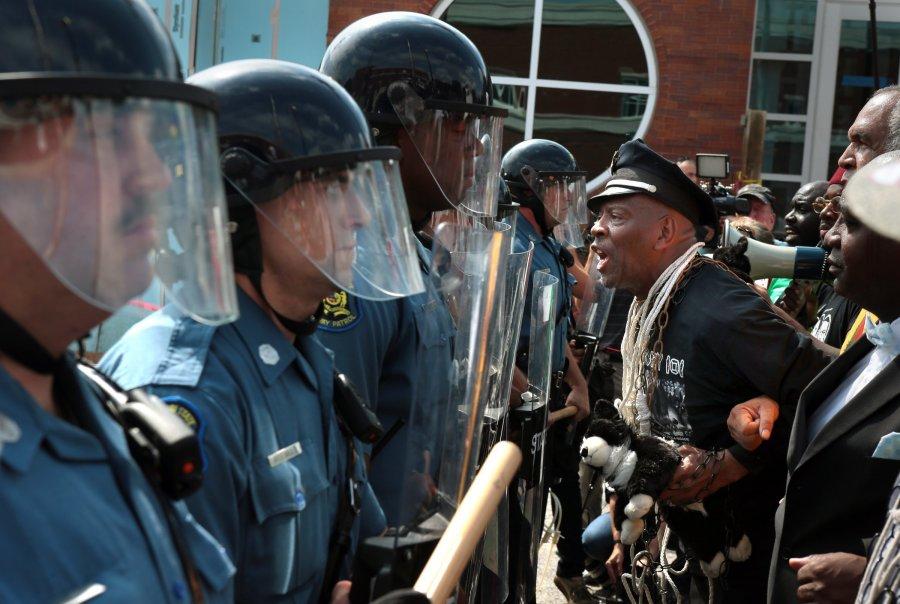Murder is murder: Why character doesn’t matter
photo by Cohen/MCT Campus
Protester Anthony Shahid leads marchers as they confront Missouri State Highway Patrol troopers in front of the Ferguson, Mo., police station on Monday, Aug. 11, 2014. Marchers are entering a third day of protests against Saturday’s police shooting of Michael Brown.
What determines the value of one’s life? Does it fluctuate based on their success in school? Or whether he or she had a sense of humor or a short temper? As absurd as this seems out of context, all of these things were implied in the aftermath of Michael Brown’s murder last month. The press focus on his past is not only futile: It is racially charged and destructive. His past, or anyone’s for that matter, does not make his murder any more just.
In the wake of the killing in Ferguson, the so-called robbery committed by Brown was talked about everywhere. In the hours prior to his death, Brown was seen stealing a box of cigars from a local convenience store. Stills of the incident were released by the police and shown on every major news network, as if this petty crime was a major part of his murder. This misdemeanor has been vastly blown out of proportion. The police officer who shot Brown, Darren Wilson, was unaware of the shoplifting incident, so how is it relevant to the coverage? This event was used to draw the conclusion that he was a bad kid, that he was going to go on to be a menace to society. This is disgraceful. It is as if he was given the death sentence for shoplifting.
In an Aug. 25 New York Times article titled “Michael Brown Spent Last Weeks Grappling with Problems and Promise,” the author, John Eligon, said that Brown is “no angel” and “dabbled in drugs and alcohol.” Later in the article, the author changed his tone and said, “He was pointed…towards a successful life.” This article is poor journalism at best, offensive and victim-blaming at worst. Why does any of this matter? Brown’s character doesn’t change the fact that an unarmed teen was shot and killed by a police officer.
Humans are dynamic; we change. One’s past does not determine one’s future. A high school valedictorian may go on to a live a life of crime. Likewise, someone with a criminal record in their younger years can go on to succeed and greatly benefit society. Brown was young. His life wasn’t destined to go one way or the other because of his previous actions, so dwelling on them is trivial.
The focus on Brown’s past takes away from the tragedy that occurred. It tries to find sense in senseless killing. In no situation should an unarmed teen be shot to death, especially by a law enforcement officer. By fixating on the microscopic details of the victim, resources and attention are being taken away from the actual problem at hand. It was the police officer who killed Brown, not Brown who got himself killed. He just happened to be in the wrong place at the wrong time. It could’ve been anybody in his situation. What he did or didn’t do in the previous 18 years of his life did not play a part in his death, so why should it be plastered on the front page of every major news source?
We, the viewers, cannot allow the media to get away with this. Just like any other business, the purpose of the news is to make money, which is constantly usurping the creation of quality content as the primary goal of networks. By tolerating the media’s focus on trivial details, we are essentially telling them that it is okay to forego the concrete, relevant evidence. The only way to stop this from occurring is to demand nothing less than quality content. We must ignore these biased reports in hope that it will cause the ratings to plummet. Only if news stations see that they cannot get away with this sub-par, tabloidesque coverage will they produce respectable content.




